人教版Unit 8 Sports教案
- 格式:doc
- 大小:90.00 KB
- 文档页数:9
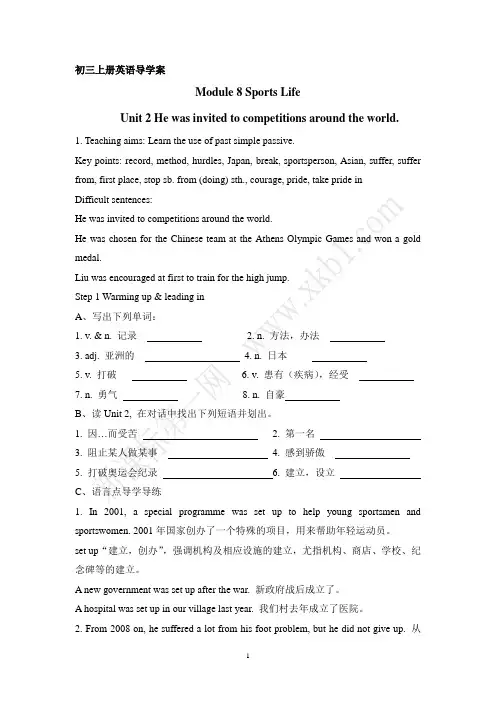
初三上册英语导学案Module 8 Sports LifeUnit 2 He was invited to competitions around the world.1. Teaching aims: Learn the use of past simple passive.Key points: record, method, hurdles, Japan, break, sportsperson, Asian, suffer, suffer from, first place, stop sb. from (doing) sth., courage, pride, take pride inDifficult sentences:He was invited to competitions around the world.He was chosen for the Chinese team at the Athens Olympic Games and won a gold medal.Liu was encouraged at first to train for the high jump.Step 1 Warming up & leading inA、写出下列单词:1. v. & n. 记录2. n. 方法,办法,经受自豪B1. 第一名3. 感到骄傲5. 建立,设立C1. In 2001, a special programme was set up to help young sportsmen and sportswomen. 2001年国家创办了一个特殊的项目,用来帮助年轻运动员。
set up“建立,创办”,强调机构及相应设施的建立,尤指机构、商店、学校、纪念碑等的建立。
A new government was set up after the war. 新政府战后成立了。
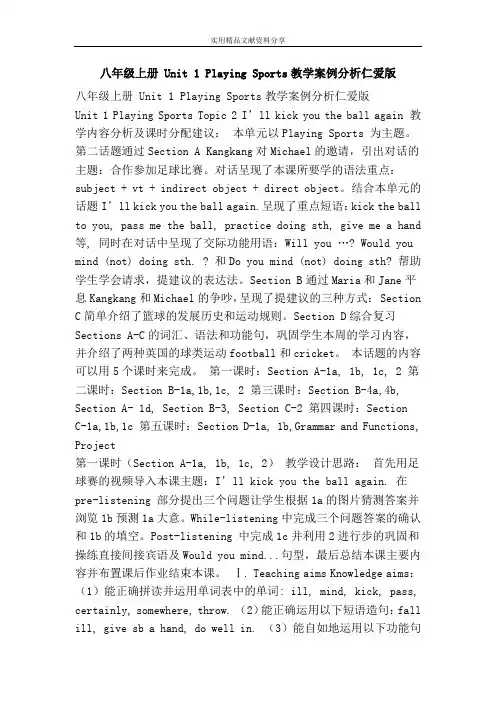
八年级上册 Unit 1 Playing Sports教学案例分析仁爱版八年级上册 Unit 1 Playing Sports教学案例分析仁爱版Unit 1 Playing Sports Topic 2 I’ll kick you the ball again 教学内容分析及课时分配建议:本单元以Playing Sports 为主题。
第二话题通过Section A Kangkang对Michael的邀请,引出对话的主题:合作参加足球比赛。
对话呈现了本课所要学的语法重点:subject + vt + indirect object + direct object。
结合本单元的话题I’ll kick you the ball again.呈现了重点短语:kick the ball to you, pass me the ball, practice doing sth, give me a hand 等, 同时在对话中呈现了交际功能用语:Will you …? Would you mind (not) doing sth. ? 和Do you mind (not) doing sth? 帮助学生学会请求,提建议的表达法。
Section B通过Maria和Jane平息Kangkang和Michael的争吵,呈现了提建议的三种方式: Section C简单介绍了篮球的发展历史和运动规则。
Section D综合复习Sections A-C的词汇、语法和功能句,巩固学生本周的学习内容,并介绍了两种英国的球类运动football和cricket。
本话题的内容可以用5个课时来完成。
第一课时:Section A-1a, 1b, 1c, 2 第二课时:Section B-1a,1b,1c, 2 第三课时:Section B-4a,4b, Section A- 1d, Section B-3, Section C-2 第四课时:SectionC-1a,1b,1c 第五课时:Section D-1a, 1b,Grammar and Functions, Project第一课时(Section A-1a, 1b, 1c, 2)教学设计思路:首先用足球赛的视频导入本课主题:I’ll kick you the ball again. 在pre-listening 部分提出三个问题让学生根据1a的图片猜测答案并浏览1b预测1a大意。
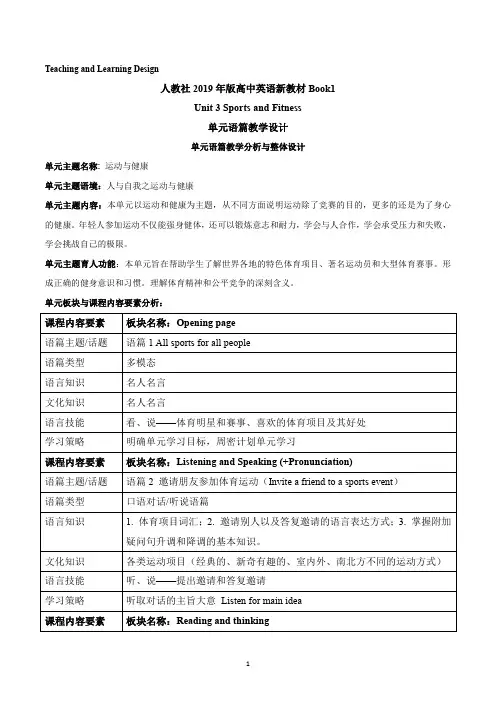
Teaching and Learning Design人教社2019年版高中英语新教材Book1Unit 3 Sports and Fitness单元语篇教学设计单元语篇教学分析与整体设计单元主题名称: 运动与健康单元主题语境:人与自我之运动与健康单元主题内容:本单元以运动和健康为主题,从不同方面说明运动除了竞赛的目的,更多的还是为了身心的健康。
年轻人参加运动不仅能强身健体,还可以锻炼意志和耐力,学会与人合作,学会承受压力和失败,学会挑战自己的极限。
单元主题育人功能:本单元旨在帮助学生了解世界各地的特色体育项目、著名运动员和大型体育赛事。
形成正确的健身意识和习惯。
理解体育精神和公平竞争的深刻含义。
单元板块与课程内容要素分析:课程内容要素板块名称:Opening page语篇主题/话题语篇1 All sports for all people语篇类型多模态语言知识名人名言文化知识名人名言语言技能看、说——体育明星和赛事、喜欢的体育项目及其好处学习策略明确单元学习目标,周密计划单元学习课程内容要素板块名称:Listening and Speaking (+Pronunciation)语篇主题/话题语篇2 邀请朋友参加体育运动(Invite a friend to a sports event)语篇类型口语对话/听说语篇语言知识 1. 体育项目词汇;2. 邀请别人以及答复邀请的语言表达方式;3. 掌握附加疑问句升调和降调的基本知识。
文化知识各类运动项目(经典的、新奇有趣的、室内外、南北方不同的运动方式)语言技能听、说——提出邀请和答复邀请学习策略听取对话的主旨大意Listen for main idea课程内容要素板块名称:Reading and thinking语篇主题/话题语篇3 选择你最喜欢的运动员(Choose your favorite athlete)语篇类型杂志文章之人物传记语言知识 1.与体育运动相关的词汇;2. 就运动员的表现和体育精神表达同意或不同意的观点;3.阅读杂志文章,提取主要信息和观点,形成个人见解4.杂志文章语篇文本结构。
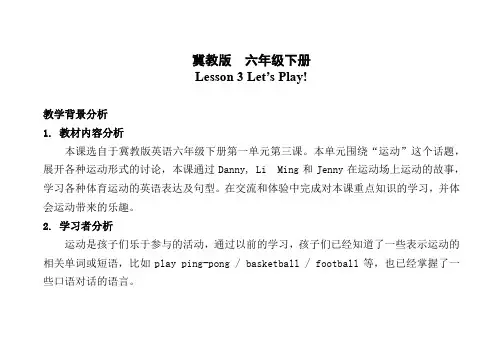
冀教版六年级下册Lesson 3 Let’s Play!教学背景分析1. 教材内容分析本课选自于冀教版英语六年级下册第一单元第三课。
本单元围绕“运动”这个话题,展开各种运动形式的讨论,本课通过Danny, Li Ming和Jenny在运动场上运动的故事,学习各种体育运动的英语表达及句型。
在交流和体验中完成对本课重点知识的学习,并体会运动带来的乐趣。
2. 学习者分析运动是孩子们乐于参与的活动,通过以前的学习,孩子们已经知道了一些表示运动的相关单词或短语,比如play ping-pong / basketball / football等,也已经掌握了一些口语对话的语言。
教学目标1. 语言知识与技能(1)能听说读写词汇basketball, try, heavy, difficult, easy, hand;能听说并理解词汇throw, catch。
(2)在对运动器材直观感知的过程中能熟练运用句型The…is light/heavy. This is too easy/difficult.来表达自己的感受。
能准确运用短语throw/catch the basketball,以及句型Are you ready to learn to play…?Let me try! 等描述运动的过程。
(3)能在图片的帮助下听懂、读懂、朗读对话。
(4)能灵活运用关键句型表演或创编新的对话。
2. 情感态度通过本课的学习,让学生体会到英语学习的乐趣,乐于感知并积极尝试使用英语,在交流中感受运动的乐趣,培养学生安全运动的意识。
教学重难点1. 教学重点在学习如何打篮球的过程中,掌握两组反义词:easy-difficult, heavy-light,并了解一些常用动词及其变化形式:throw-throwing,等。
2. 教学难点正确流利的表达或描述运动的过程及其感受。
教学过程Step I Free talkT: Good morning, Children.T: Are you ready for English class?T: What day is it today?T: How’s the weather today?T: What sport do you play?T: What’s your favourite sport?T: What’s my favourite sport? Can you guess?T: Yes, my favourite sport is basketball? I like playing basketball. Do you like playing basketball?T: Ok! Let’s play together. This class we’ll learn Lesson 3 Let’s Play! Step II New Concepts1.教授throw和catch (出示篮球,做投篮动作)T: Look! What am I doing?T:Yes,Iam throwing the basketball.引出throw,教授throw,纠音。
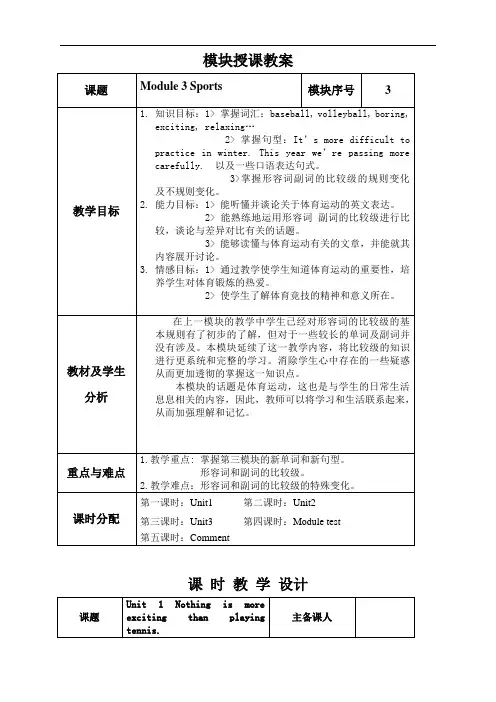
模块授课教案课题Module 3 Sports 模块序号 3教学目标1.知识目标:1> 掌握词汇:baseball, volleyball, boring,exciting, relaxing…2> 掌握句型:It’s more difficult topractice in winter. This year we’re passing more carefully. 以及一些口语表达句式。
3>掌握形容词副词的比较级的规则变化及不规则变化。
2.能力目标:1> 能听懂并谈论关于体育运动的英文表达。
2> 能熟练地运用形容词副词的比较级进行比较,谈论与差异对比有关的话题。
3> 能够读懂与体育运动有关的文章,并能就其内容展开讨论。
3.情感目标:1> 通过教学使学生知道体育运动的重要性,培养学生对体育锻炼的热爱。
2> 使学生了解体育竞技的精神和意义所在。
教材及学生分析在上一模块的教学中学生已经对形容词的比较级的基本规则有了初步的了解,但对于一些较长的单词及副词并没有涉及。
本模块延续了这一教学内容,将比较级的知识进行更系统和完整的学习。
消除学生心中存在的一些疑惑从而更加透彻的掌握这一知识点。
本模块的话题是体育运动,这也是与学生的日常生活息息相关的内容,因此,教师可以将学习和生活联系起来,从而加强理解和记忆。
重点与难点1.教学重点: 掌握第三模块的新单词和新句型。
形容词和副词的比较级。
2.教学难点:形容词和副词的比较级的特殊变化。
课时分配第一课时:Unit1 第二课时:Unit2第三课时:Unit3 第四课时:Module test 第五课时:Comment课时教学设计课题Unit 1 Nothing is moreexciting than playingtennis.主备课人授课时间2014年09 月课型Listening and speaking教学目标1.知识与能力:1> 掌握词汇:baseball, volleyball, boring,exciting, relaxing…2> 掌握句型:It’s more di fficult to practicein winter. This year we’re passing more carefully. 以及一些口语表达句式。
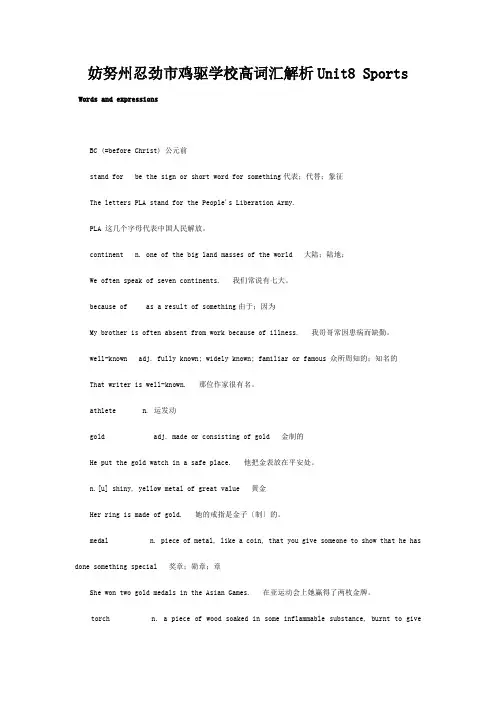
妨努州忍劲市鸡驱学校高词汇解析Unit8 SportsWords and expressionsBC (=before Christ) 公元前stand for be the sign or short word for something代表;代替;象征The letters PLA stand for the People's Liberation Army.PLA 这几个字母代表中国人民解放。
continent n. one of the big land masses of the world 大陆;陆地;We often speak of seven continents. 我们常说有七大。
because of as a result of something由于;因为My brother is often absent from work because of illness. 我哥哥常因患病而缺勤。
well-known adj. fully known; widely known; familiar or famous 众所周知的;知名的That writer is well-known. 那位作家很有名。
athlete n. 运发动gold adj. made or consisting of gold 金制的He put the gold watch in a safe place. 他把金表放在平安处。
n.[u] shiny, yellow metal of great value 黄金Her ring is made of gold. 她的戒指是金子〔制〕的。
medal n. piece of metal, like a coin, that you give someone to show that he has done something special 奖章;勋章;章She won two gold medals in the Asian Games. 在亚运动会上她赢得了两枚金牌。
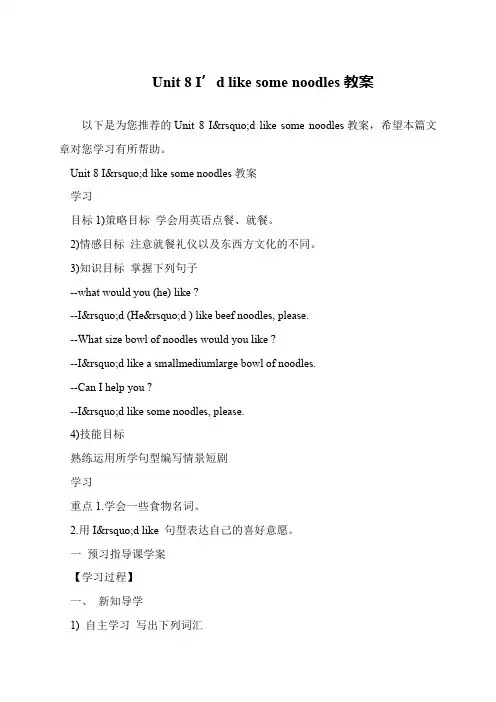
Unit 8 I’d like some noodles教案
以下是为您推荐的Unit 8 I’d like some noodles教案,希望本篇文章对您学习有所帮助。
Unit 8 I’d like some noodles教案
学习
目标1)策略目标学会用英语点餐、就餐。
2)情感目标注意就餐礼仪以及东西方文化的不同。
3)知识目标掌握下列句子
--what would you (he) like ?
--I’d (He’d ) like beef noodles, please.
--What size bowl of noodles would you like ?
--I’d like a smallmediumlarge bowl of noodles.
--Can I help you ?
--I’d like some noodles, please.
4)技能目标
熟练运用所学句型编写情景短剧
学习
重点1.学会一些食物名词。
2.用I’d like 句型表达自己的喜好意愿。
一预习指导课学案
【学习过程】
一、新知导学
1) 自主学习写出下列词汇。
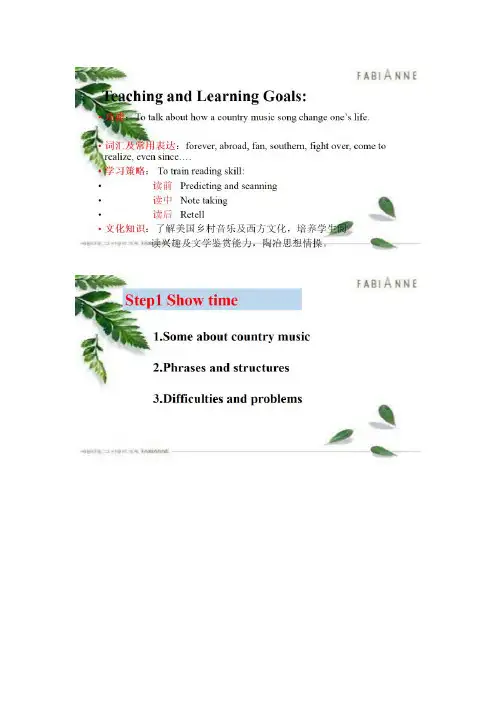
学情分析: 学生从本单元开始学习现在完成时,本节阅读课运用现在完成时谈论音乐--乡村音乐对人生的影响,教学伊始通过乡村音乐歌手Garth Brooks的精彩演唱吸引学生的注意力,并轻松过渡到文本信息的讲授,轻松自然,学生乐于接受,在教学过程,结合学生实际设计任务阅读,层层递进,由易到难,照顾学生的知识接受水平,并激发学生的阅读愿望,让学生乐于接受,充分发挥学习的主动性。
学生学习效果评价量表
评价要素 主要指标(权重) A B C 个人自评 学生互评 教师评价 知识的掌握情况 20% 完成基本练习的过程中,能完成变形和拓展练习 除完成基本练习以外,可根据自己的能力,有选择地做一些较高要求的作业 掌握基础知识,能完成基本练习
思维能力发展情况 20% 能一题多解具有发散、综合思维能力 勇于质疑,具有独立思维的能力 只能停留在某种固定模式上思考
解决问题能力 40% 能通过多个方案择优解决问题 基本能独立解决问题,只是思路单一。 只有通过合作,才有望解决问题。
合作交流 10% 善于与人合作,不光有主见,还虚心听取别人的意见 能与人合作,能接受别人的意见。 缺乏合作的精神,固执己见。
Unit8 Have you ever read Treasure Island yet? B Reading 教材分析: 本课为人教版人民教育出版社义务教育教科书八年级上册Unit8 Have you ever read Treasure Island yet? Section B 阅读部分,主要在学习A部分的基础上加深对现在完成时态的理解巩固及综合运用,在整堂课的课堂活动设计上,主要结合初中生的心理特点,采用任务活动法,使得学生在完成任务的过程中,学会语言,发展学生的综合语言运用能力。
一、英汉互译。 1、__________ 人数 2. __________ (过去)常常做某事 3. __________ 在国外学习 4. __________ 使某人做某事 5. __________ 开始意识到 6. __________ 自从那时起 7. __________ 美国的南部地区 8. __________ 属于 9. __________ 善待彼此 10. __________ 互相信任 11. __________ 大自然的美 12. __________ 去过某地 13. __________ 对…做研究 二、根据句意及汉语提示完成句子。 1. I think that we will live together _______ (永远). 2. I want to meet you before you go ___________(在国外). 3.____________ (现代的) cars have long lives. 4. She has had some ____________(成功). 5. Do you _________(属于)to this club? 三、单项选择。 1. --Where is your mother? --She ______ to the supermarket. A. went B. has gone C. want D. has been 2. -- Have you done the job yet? --__________. A. Not already B. Not yet C. No, I don’t D. No never 3. --Mary, do you know where Tom is? --He must ____Shanghai. A. have been to B. has been in C. have gone to D. have been in 4. In the last two months, he ______ several English novels. A. reads B. read C. has read D. had read
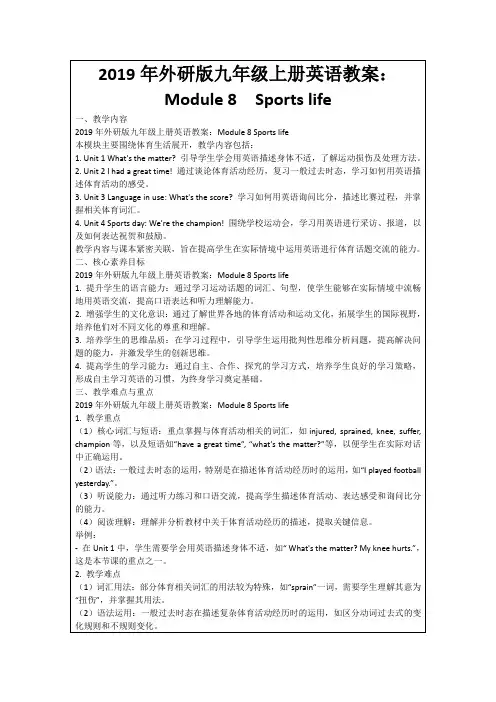
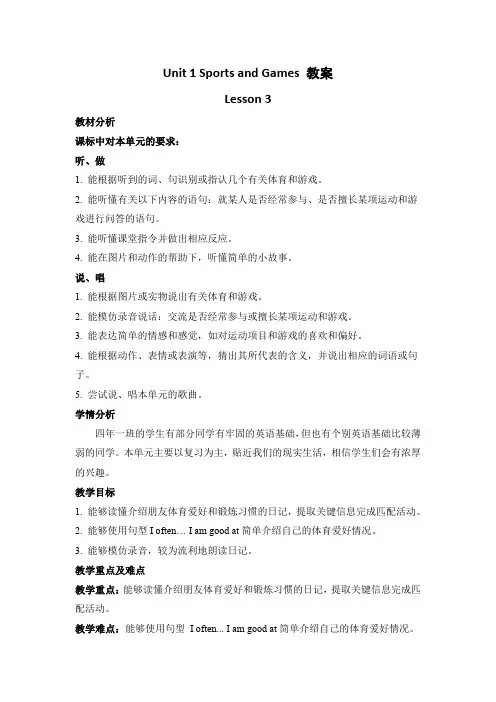
Unit 1 Sports and Games 教案Lesson 3教材分析课标中对本单元的要求:听、做1. 能根据听到的词、句识别或指认几个有关体育和游戏。
2. 能听懂有关以下内容的语句:就某人是否经常参与、是否擅长某项运动和游戏进行问答的语句。
3. 能听懂课堂指令并做出相应反应。
4. 能在图片和动作的帮助下,听懂简单的小故事。
说、唱1. 能根据图片或实物说出有关体育和游戏。
2. 能模仿录音说话:交流是否经常参与或擅长某项运动和游戏。
3. 能表达简单的情感和感觉,如对运动项目和游戏的喜欢和偏好。
4. 能根据动作、表情或表演等,猜出其所代表的含义,并说出相应的词语或句子。
5. 尝试说、唱本单元的歌曲。
学情分析四年一班的学生有部分同学有牢固的英语基础,但也有个别英语基础比较薄弱的同学。
本单元主要以复习为主,贴近我们的现实生活,相信学生们会有浓厚的兴趣。
教学目标1. 能够读懂介绍朋友体育爱好和锻炼习惯的日记,提取关键信息完成匹配活动。
2. 能够使用句型I often… I am good at简单介绍自己的体育爱好情况。
3. 能够模仿录音,较为流利地朗读日记。
教学重点及难点教学重点:能够读懂介绍朋友体育爱好和锻炼习惯的日记,提取关键信息完成匹配活动。
教学难点:能够使用句型I often... I am good at简单介绍自己的体育爱好情况。
教学基本策略及设计思路根据教学目标和学生的情况,本节课采用了情景教学法,引导学生在特定的情景中,以小组协作的方式完成任务型活动。
在听,说,玩,演,中轻松的学习。
学生通过体验、讨论、合作、探究等方式,运用观察、发现、归纳等方法,学习语言知识。
本节课主要采用多媒体教学课件作为教学辅助材料,给学生提供了直观的学习工具,能充分调动学生的各种感官积极参与各项活动。
教学过程1. Pre-task preparation(1) Greetings.(2) Sing the song to begin our class.设计意图:歌曲导入既激起学生兴趣又对单词句型进行了复习。
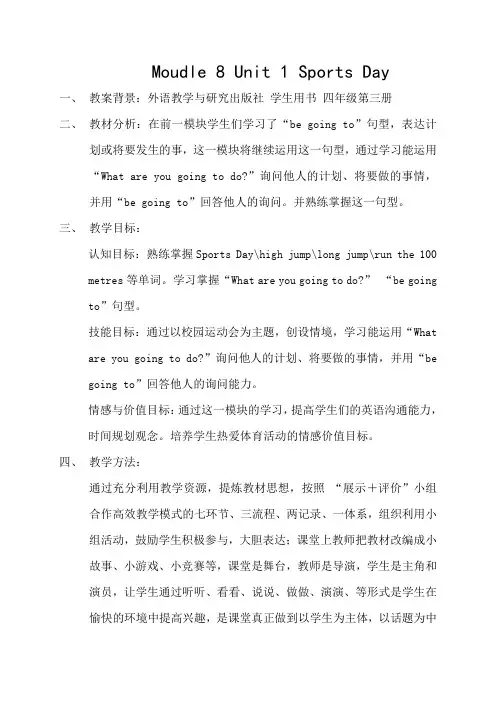
Moudle 8 Unit 1 Sports Day一、教案背景:外语教学与研究出版社学生用书四年级第三册二、教材分析:在前一模块学生们学习了“be going to”句型,表达计划或将要发生的事,这一模块将继续运用这一句型,通过学习能运用“What are you going to do?”询问他人的计划、将要做的事情,并用“be going to”回答他人的询问。
并熟练掌握这一句型。
三、教学目标:认知目标:熟练掌握Sports Day\high jump\long jump\run the 100 metres等单词。
学习掌握“What are you going to do?”“be going to”句型。
技能目标:通过以校园运动会为主题,创设情境,学习能运用“What are you going to do?”询问他人的计划、将要做的事情,并用“be going to”回答他人的询问能力。
情感与价值目标:通过这一模块的学习,提高学生们的英语沟通能力,时间规划观念。
培养学生热爱体育活动的情感价值目标。
四、教学方法:通过充分利用教学资源,提炼教材思想,按照“展示+评价”小组合作高效教学模式的七环节、三流程、两记录、一体系,组织利用小组活动,鼓励学生积极参与,大胆表达;课堂上教师把教材改编成小故事、小游戏、小竞赛等,课堂是舞台,教师是导演,学生是主角和演员,让学生通过听听、看看、说说、做做、演演、等形式是学生在愉快的环境中提高兴趣,是课堂真正做到以学生为主体,以话题为中心,以活动为主线,培养学生的学习能力。
五、教学过程:课前指导练字:上课提前2分钟,知道学生练一字“英”。
练字前,让学生注意自己书写时的三姿。
练字是,先指出字的上下结构以及笔顺,并在田字格内一笔一画指导。
(一) Warming up.Sing an English song.T : Good morning boys and girls.Ss: Good morning teacher.T : Today we’re going to learn module8.First let’s sing the song “Bingo”. OK! Let’s go!(备注:通过一首简单的英语歌作为本节课的热生活动,集中了学生们的注意力,激发了他们的英语学习兴趣。
人教版高中英语(2019)必修第一册Unit 3 Sports and Fitness一、词汇1、识记fitness, soccer, stadium, boxing, badminton, marathon, event, ski, host, track, gym, gymnastics, sweat, legend, athlete, master, honour, glory, medal, championship, determination, apart, injure, captain, lose heart, graceful, strength, failure, cheat, million, audience, positive, slim, diet, rather than, now and then. jog, stress, error, *infer, *function, *appropriate2、词形变化fitness n. → v. &adj. fitathlete n. →adj. athleticglory n. → adj. gloriousadv. gloriouslydetermination n. → v. determineadj. determinedstrength n. → adj. strongvt. strengthenfailure n. → v. failinjure v. → adj. injuredn. injurycompete v. → n. competitorn. competitionadj. competitiveadv. competitivelypositive adj. → adv. positivelycompare v. → n. comparisonstress v. & n. → adj. stressfuladv. stressfully*function n. → adj. functionaladv. functionallyappropriate adj. → adv. appropriately3、应用1. come短语及相关练习come about 发生come across sb/sth偶遇come back 回来,再度流行;恢复;复原come down 塌陷,崩溃,(物价气温等)下降;come in (潮水)涨,当令,上市,开始流行,当权come into 进入;加入come into being 开始存在come into force 开始实行;开始生效(=come into effect)come into power 上台,掌握政权come into use 开始使用come off 发生;(informal)举行;(计划企图等)成功;脱落come on 跟随;进步;发展;(雨季,夜,病等)来到;(演员)登场;问题被提出来;语气词;加油(=JiaYou);(表示某人说话不正确)得了吧;(常用进行时)(疾病或某种心情)开始;(电视节目等)开始;开始运转,运行come out (太阳等)出现;(真相)大白;(消息)传出;出版,发表come over 从远处来;改变立场意见come to prep. 苏醒;归结为;总计;涉及到;终于come to an end 结束come to life 苏醒come up (种子等)长出地面;被提出;出现;即将发生;走近;长出;流行;呕吐出来come up to prep.达到;等于;不辜负;走近come up with 发现(解决办法答案)(05江西,28)Please tell me how the accident ______. I’m still in the dark.A. came byB. came upC. came toD. came about (06湖北,25)It's already 10 o’clock. I wonder how it ______ that she was two hours late on such a short trip.A. came overB. came outC. came aboutD. came up2. work词性、词义、短语及相应用法v. 工作,劳动,干活work at/on 从事于I’ve been working at my homework all day.我整天都在做作业。
Unit1 Sports Lesson 6 A Famous Football Player教学目标1.学生了解足球运动员Cristiano Ronaldo的基本信息和成就。
2.学生能够用英语描述Cristiano Ronaldo的职业生涯和成功之路。
3.学生能够利用所学的知识和英语表达能力,描述自己对体育和运动员的热爱和憧憬。
教学内容本课以足球运动员Cristiano Ronaldo为例,通过阅读、听力和表达,让学生了解该运动员的职业生涯和成功之路,并通过学习来激发学生对体育和运动员的热爱和憧憬。
Step 1: 课前活动1.老师播放Cristiano Ronaldo比赛的视频,让学生感受足球的魅力。
2.学生就自己喜欢的运动员做一个简短的介绍,并说明为什么喜欢这个运动员(或运动队)。
Step 2: 阅读文本及语音播放1.老师播放英语版的Cristiano Ronaldo的文本,让学生跟读,并帮助学生理解文章的关键词汇和句子。
2.学生自主阅读中文翻译,并了解文章大意。
Step 3: 组织讨论1.老师提问:Cristiano Ronaldo是谁?他有哪些成就?2.学生在小组内进行讨论,然后展示结果,并进行讲解。
Step 4: 表达训练1.学生自主撰写一篇50-100字的短文,介绍自己喜欢的运动员,并表达自己在体育运动方面的憧憬和目标。
2.老师鼓励学生分享自己的文章,并进行点评和指导。
Step 5: 课后反思1.学生总结本节课所学的内容,强化记忆。
2.学生总结自己学习过程中的不足之处,并提出改进方法。
教学评估1.学生能够正确回答有关Cristiano Ronaldo的问题。
2.学生能够用英语描述Cristiano Ronaldo的职业生涯和成功之路。
3.学生能够撰写出一篇简短的短文,介绍自己喜欢的运动员并表达自己在体育运动方面的憧憬和目标。
教学资源1.Cristiano Ronaldo的英文介绍文章2.Cristiano Ronaldo的中文翻译3.Cristiano Ronaldo比赛视频4.其他相关教学资源以上是本节课的教案,通过学习学生能够了解到足球运动员Cristiano Ronaldo的基本信息和成就,以及通过撰写短文的形式,表达自己对运动员和体育运动的热爱。
部审外研版初中英语九年级上册 Module 8 Sports life,Unit3 Language in use 教学反思(最新版)编制人:__________________审核人:__________________审批人:__________________编制单位:__________________编制时间:____年____月____日序言下载提示:该文档是本店铺精心编制而成的,希望大家下载后,能够帮助大家解决实际问题。
文档下载后可定制修改,请根据实际需要进行调整和使用,谢谢!并且,本店铺为大家提供各种类型的经典范文,如语文资料、数学资料、英语资料、幼儿资料、教案大全、案例分析、教学反思、教育笔记、说课稿、其他资料等等,想了解不同范文格式和写法,敬请关注!Download tips: This document is carefully compiled by this editor.I hope that after you download it, it can help you solve practical problems. The document can be customized and modified after downloading, please adjust and use it according to actual needs, thank you!In addition, this shop provides various types of classic sample essays, such as Chinese materials, mathematics materials, English materials, children’s materials, lesson plans, case analysis, teaching reflection, education notes, lecture notes, other materials, etc. if you want to know the difference Please pay attention to the format and writing of the sampleessay!部审外研版初中英语九年级上册 Module 8 Sports life,Unit3Language in use 教学反思NSE 9A M8U3教学反思一:教学亮点:本节课立足于“使用多模态语篇分析来探索语篇的主题意义、教授语言知识和发展语言技能”这一学科理念,通过篇章、问题、图片、任务型阅读活动和调查活动,来引导学生探索、体验和继承发扬奥运精神的同时学习语言知识发展语言技能。
教案:六年级下册英语教案 Unit 1 Sports Lesson 3 Let'splay1. 教学目标(1) 知识目标学生能够听懂、会说、会读本节课的生词和重点句子。
学生能够通过图片和情景,理解并运用本节课的重点句型"Let's play " 进行交流。
(2) 能力目标学生能够通过小组合作,运用本节课所学内容进行角色扮演和情景对话。
学生能够通过听力、口语和阅读活动,提高自己的英语语言能力。
(3) 情感目标学生能够积极参与体育活动,增强体质,提高健康意识。
学生能够通过体育活动,培养团队精神,增强合作意识。
2. 教学内容本节课的主要内容是学习与体育活动相关的词汇和句子,以及运用这些词汇和句子进行交流。
3. 教学重点与难点重点:本节课的重点是学生能够听懂、会说、会读本节课的生词和重点句子,以及能够运用这些词汇和句子进行交流。
难点:本节课的难点是学生能够正确地运用重点句型 "Let'splay " 进行交流,并在实际情景中进行运用。
4. 教具与学具准备教具:教师准备本节课的生词卡片、图片、录音机和磁带等教具。
学具:学生准备课本、练习本、铅笔等学具。
5. 教学过程(1) 热身活动 (5分钟)教师组织学生进行体育活动,如跑步、跳绳等,激发学生的学习兴趣。
教师与学生进行简单的英语交流,如 "Let's run!"、"Let's jump!" 等,引导学生进入学习状态。
(2) 呈现新课 (10分钟)教师通过生词卡片和图片,呈现本节课的生词和句子。
教师引导学生跟读生词和句子,确保学生能够正确发音。
(3) 练习活动 (10分钟)教师组织学生进行小组活动,让学生运用本节课的词汇和句子进行交流。
教师选取几个小组进行展示,给予表扬和鼓励。
(4) 听力活动 (10分钟)教师播放本节课的听力材料,让学生听懂并回答相关问题。
第 1 页 共 9 页 Unit 8 Sports I. 单元教学目标 技能目标Goals 1.Talk about sports. 2.Talk about the O1ympic Games. 3.Talk about interests and hobbies. 4.Use the Future Passive Voice. 5.Talk about what will be done. 6.Write a sports star’s profi1e.
Ⅱ.目标语言
功 能 句 式 兴趣和爱好(Interests and hobbies) Which do you like,...or...? I like watching it. What’s your favorite sport? Shooting,I think. Which sports do you like best? I like...best. Which do you prefer,...or...? I prefer...to... What about ...? I’d rather watch it than play it. Are you interested in...? Yes, very much No,not really. Sure. I love sports.
词 汇 1. 四会词汇: BC, AD, continent, well-known, athlete, gold, medal, torch, badminton, speed, skating, track and field, tie, final, dive, shooting, Greece, competitor, motto, further, rank, gymnastics, prepare, preparation, effect, flame, compete, flag, weight, position, point, superstar, skill, weigh, title, gesture, facial. 2. 认读词汇: Mardi Gras, Ramadan, Arabic, bunny, destruction, Kwanzaa, Swahili, community, reminder, Day of the Dead, Mexico, occasion, Halloween, Obon. 3. 词组: stand for, because of, would rather, take part in, preparation for 4.重点词汇: competitor, motto, further, gymnastics, prepare, preparation, effect, compete, weigh 结构 被动语态(2) 1. 使用将来时被动语态——用英语描述事物将受到某种影响或某种处理。 e.g. More trees will be planted and new roads will be built. 2. 使用将来时被动语态——用英语描述人物将被动地接受某种行为或 第 2 页 共 9 页
某种处理。 e.g. A great number of reporters will be invited to Beijing to report the 29th Olympic Games.
重 点 句 子 1. Every four years athletes from all over the world take part in the Olympic Games. P52. 2. The ancient Olympic Games began around the year 776 BC in Greece. P53. 3. They were held in Greece——the country in which the Games were born. P53. 4. The Olympic motto is “Faster, Higher, Stronger.” P53. 5. Following the history-making success in the 2000 Sydney Olympic Games, China won another great competition in 2001, which was not for a medal. P53. 6. It was the competition between countries to host the Olympic Games. P53. 7. The people of Beijing... will be preparing to light the Olympic torch to welcome athletes and sports fans from all over the world. P53 III. 教材分析与教材重组 1. 教材分析 本单元以sports为话题,使学生了解“各种体育运动”、“奥运会”、“体育爱好与兴趣”,能用所学的有关sports 的词汇描述自己喜爱的体育运动和体育明星的生平及事迹;能够运用所学的语言知识和技能听懂体育赛事报道,谈论各项体育运动。 1.1 Warming up 是一份类似知识自测的问卷调查,测试学生对奥运会的了解程度。目的有两个,一是呈现本单元的中心话题——Sports and Olympic Games,帮助学生在大脑中形成一个有关“Sports”的信息包;二是学习和复习有关描述体育运动的名词,为下一步关于 "体育运动"的听、说、读、写打下基础。 1. 2 Listening 是三则体育赛事报道,分别关于NBA、足球联赛和乒乓球比赛。在这部分中,学生要通过听来捕捉信息。这些信息包括:体育项目、比分情况及比赛结果。这是一项具体、真实的任务,整体设计符合体育新闻特点,难度适中。通过这项任务的完成,可以达到以下目的:①增加学生相关的体育知识,并以此诱发、培养学生对体育的兴趣;②训练和提高学生听体育新闻报道的技能技巧;③学习和复习有关描述体育比赛结果的表达方式。 1. 3 Speaking 是一项采访活动,内容是调查了解同学最喜爱的体育活动及原因。活动以“说”为主,兼容了听和写的技能,比较完整的体现了语言能力的综合训练。这项设计的特点是:①训练学生在比较真实的情景中使用有关体育的兴趣、爱好方面的用语及口头表达能力;②丰富学生有关描述“体育”的语言,包括词汇和句型等;③进一步帮助学生提高对体育活动的认识。 1. 4 Pre-reading 是READING的热身活动。设计了四个问题供学生讨论。其中前两个问题是在Warning up, Listening, 和Speaking所涉及话题的基础上,进一步提高学生对体育活动的正确认识;后两个问题涉及奥运会,旨在引导学生理解奥运会的重要性和奥运会所倡导的体育精神。这部分的设计既有利于培养学生的开放性思维能力,又为引导学生下一步的“阅读”作好思想准备。 1. 5 Reading 是一篇叙述性的说明文,介绍了现代奥运会的发展历史,奥运会在世界范围的影响,以及举办奥运会的最高宗旨。最后还介绍了全世界人民 第 3 页 共 9 页
对举办奥运会充满热情以及中国人民正在为2008年第29届奥运会在中国的顺利举行而作出的积极努力。通过这一部分的学习,可以使学生更加全面、更加深刻的理解"奥运"在世界人民生活中所起的重要作用,也可以使学生更好的理解和学习“奥运”精神。 1. 6 Post-reading 部分设计了三类问题,其中前两类是针对文章的理解,评价学生对文章理解的程度;第三类是"读前"中的议题的发展,要求学生结合文章谈谈举办奥运会对一个城市或一个国家正反两方面的影响, 具有很大的灵活性和开放性,旨在培养学生辩证地、客观地分析问题的能力以及更高水准的英语语言表达能力。 1. 7 Language study 分为词汇和语法两项。词汇部分设计了八个与奥运会有关的字谜,引导学生分类记忆单词,培养学生运用英语解释单词的能力。语法项目是一般将来时的被动语态。要求学生围绕"北京为奥运会做准备"这一话题做机械性句型转换练习,来操练这一语法项目。两道大题在形式和难度上都有一定的梯度。教师在此基础上还可做些拓展性和巩固性练习设计。 1. 8 Integrating skill 包括读和写两部分。该部分设计了一个以阅读为基础的写作任务:写一段人物简介。 阅读部分是一篇关于我国著名篮球运动员姚明的简介。写作部分的任务是仿写自己最喜爱的体育明星的简介。目的是继续学习以人物介绍为主题的写作能力。由于题材贴近学生生活,这个写作任务还有利于调动他们的学习积极性。
2. 教材重组 2. 1 从话题内容上分析, LISTENING, SPEAKING与Workbook中的LISTENING相一致;而WARMING UP 与Workbook中的TALKING比较一致。从训练目的上分析,两个LISTENING一致。从教材份量来说,可将WARMING UP,SPEAKING和Workbook中的TALKING整合在一起,设计成一节任务型“口语课”。 2. 2 将LISTENING 和Workbook中的LISTENING整合在一起,设计成一节 “听力课”。 2. 3 可将PRE-READING, READING和POST-READING三个活动整合在一起上一节“阅读课(一)”。 2. 4 可将 LANGUAGE STUDY 与Workbook中的PRACTISING语法练习题整合在一起上一节“语法课”。 2. 5 可将 INTEGRATING SKILLS 中1.Reading和Workbook中INTEGRATING SKILLS 的Reading整合起来上一节“阅读课(二)(泛读课)”。 2. 6 将 INTEGRATING SKILLS 中的Part 2和 Workbook中INTEGRATING SKILLS 的Writing整合成一节“写作课”。
3. 课型设计与课时分配(经教材分析,根据学情,本单元可以用6课时教完) 1st period 口语课 2nd period 听力课 3rd period 阅读课 4th period 语法课 5th period 泛读课 6th period 写作课